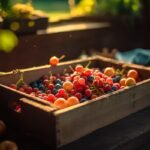
In the Shadow of Conflict: Israeli Farmers Face an Uncertain Future
- foodfightadmin
- October 31, 2023
- Global Hunger
- rsc pages, rscl
- 0 Comments
In the verdant fields of Ashkelon, Israel, where once the rhythms of nature dictated the daily grind, a new, grim tempo has taken hold. Amidst the escalating conflict, Avi Chivivian, an organic vegetable farmer, now sows his seeds to the beat of military operations. His farm, nestled in southern Israel’s ‘vegetable barn,’ a region supplying a significant portion of the nation’s vegetables, has become a frontline in a different kind of battle.
Chivivian, like many in this agricultural stronghold near the Gaza border, must now align his farming schedule with military directives. The recent cross border attack by Hamas militants on Oct. 7 has transformed the area into a high security zone, with soldiers meticulously combing his fields for threats before granting a mere six-hour window for work.
The stakes are high. “If we don’t plant potatoes now, there won’t be any in the spring,” Chivivian asserts, underlining the looming food crisis if the fields lay fallow. His once thriving 65-acre farm in Yated, a small village, now mirrors a battleground, with crops lying dead, casualties of the conflict.
This agricultural crisis extends beyond the Gaza vicinity. In the north, near the Lebanese and Syrian borders, entire communities face evacuation due to Hezbollah’s rocket fire. The resultant exodus of foreign laborers and the abandonment of farming towns have compelled Israel to lean heavily on vegetable imports, a stark contrast to its previous self reliance.
Uri Dorman of the Israel Farmers Association paints a bleak picture: most of Israel’s leafy greens, tomatoes, cucumbers, and bell peppers, once proudly harvested locally, now risk being replaced by imports. The nation’s northern farms, contributing significantly to the country’s sub tropical fruit and egg production, are equally imperiled.
The war’s ripple effects are palpable. Chivivian’s plight is shared by many. His home in Jerusalem, where his wife and six children have taken refuge, and the empty, tornado struck appearance of his kibbutz, are testaments to the war’s toll on the agrarian community. The government’s silence in aid compounds their distress.
In a bid to salvage what remains, the Agriculture Ministry is extending work visas for foreign workers, offering financial incentives, and proposing infrastructural support like greenhouses and bomb shelters. Yet, the challenge is monumental. Israel’s agricultural workforce, heavily reliant on foreign and Palestinian labor, has been decimated. The call of 360,000 reservists further strains the labor pool, leaving even basic farming roles unfilled.
The response has been a surge of volunteerism. At the Dafna family orchard, volunteers risk air raids to harvest pomegranates. Their efforts, while heroic, are but a stopgap, as Liad Vaknin of Israel’s Dairy Council points out. These volunteers, lacking the expertise of seasoned farm workers, can only do so much.
The situation is even more dire for farms like Marcelo Wasser’s dairy near the Gaza border. Wasser, braving rocket attacks and personal danger, continues to tend to his cows despite the evacuation of his family and community. His story, emblematic of many, highlights the resilience yet vulnerability of Israel’s farming sector in the face of unrelenting conflict.
As farmers like Chivivian and Wasser forge ahead, the future of Israeli agriculture hangs in the balance. The war not only threatens their livelihoods but also poses a profound question: How can farming, an essential lifeline, endure in the shadow of persistent conflict?








